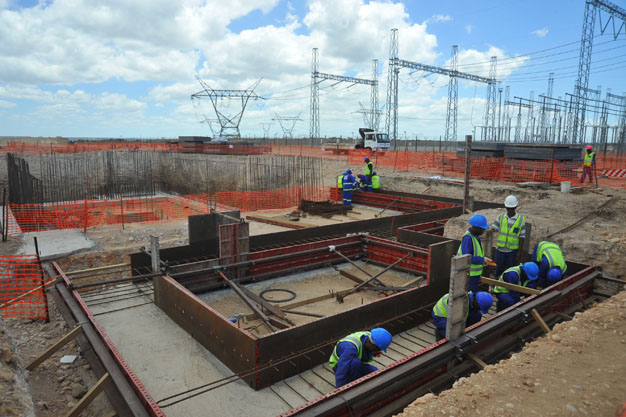Over the last decade, African officials and business leaders have traversed the United States proclaiming that myriad opportunities await U.S. small businesses on a continent that’s gearing up to vie for local and global market share.
The response to date has been feeble, which is as disappointing to Africans as it is to those in the U.S. who want to see a stronger presence of U.S. small and medium-size businesses on Africa’s commercial and investment landscape. For the latter, deep incursions by businesses from China, India and Latin America are a teeth-gritting reality—one that led, in part, to the launch in 2012 of the U.S. government’s Doing Business in Africa Campaign.
At this year’s Rainbow/PUSH Wall Street Project Economic Summit in New York, both sides made yet another appeal, specifically to African-American businesses, during a panel discussion devoted exclusively to investing in Africa and which I moderated. A similar note was struck at the 2014 Summit’s Africa Investment Opportunities Forum.
“This is a different day and a different time. There are many new opportunities for us to engage in Africa,” Florizelle Liser, assistant U.S. Trade Representative for Africa, declared. “Africa accounts for only 3 percent of all world trade and 2 percent of all foreign direct investment. [Its] potential has barely been tapped.”
Liser is the Obama administration’s point person on the implementation of the Africa Growth and Opportunity Act, the cornerstone of U.S commercial engagement with Africa, and coordinator of the administration’s Africa Export Policy,
African officials and business leaders on the panel came prepared with an array of specific opportunities.
“We’d love African-Americans to do business with us, but we don’t see you on the ground,” said Minyem Alain, president of the Small and Medium Enterprise Confederation of Cameroon, and managing director of Ortho Services, a Cameroon-based engineering, construction and civil works company operating in west and central Africa.
Alain said his country’s hosting the Africa Cup of Nations female and male football championships in 2016 and 2019, respectively, would be a good entry point for African-American companies. “There will be a massive construction plan in terms of infrastructure, hotels, leisure, restaurants. That can be a very good opportunity for SMEs because multinationals are not focused on this kind of businesses. They are focused on oil and gas. African-Americans can come into the game. They can propose tech services, for example.”
Other entry points exist in energy and mobile communications, Alain said, and called attention to Cameroon’s plan to focus on micro hydroelectric power. “Micro power is a sector where SMEs can come into the game. The other opportunity is, we only have two licenses for GSM and we’re now looking for partners to open the game. African-Americans are well positioned to enter the game. They can partner with local SMEs.”
Nkosinathi Benson Fihla, executive mayor of Nelson Mandela Bay Metropolitan Municipality in South Africa’s Eastern Cape Province, pinpointed tourism and marine as his priority investment sectors. His municipality includes the city of Port Elizabeth, which is home to one of South Africa’s major seaports and to the Coega Industrial Development Zone (pictured above), an investment hotspot for businesses focused on global markets.
“When people speak of South Africa, they always think of Johannesburg, Durban and Cape Town, not of places like Port Elizabeth. We have a long coast so we are focusing on a marine economy and tourism,” the mayor said. “Our biggest challenge is tourism because it creates more work for people. One problem is memorializing icons of our liberation. [Port Elizabeth] is the place where our legends of the struggle were born, such as Nelson Mandela and Thabo Mbeki,” Mayor Fihla said.
Angola, meanwhile, has extended its national development plan, placing emphasis on growing its economy sustainably, said Jeannine Scott, president of the U.S.-Angola Chamber of Commerce, and founder/principal of America to Africa Consulting (A2A) LLC. Beyond moving its economy away from over-dependence on oil and minerals, the country is looking to reduce poverty. It’s also looking for ways “to tell the Angola story—to promote a more positive image of the country,” Scott said, responding to a query about opportunities in media.
The chamber will lead a mission to Angola in March to introduce U.S. businesses to trade and investment opportunities in agriculture, construction, education, financial services, manufacturing, mining, oil services, transportation and other sectors.
“Angola really is one of those countries on the continent of Africa that you should take a second look at. It is looking for a number of partners to come and invest with them and they are asking where the Americans are in this regard,” Scott said.
The Angola Investment Authority has set a minimum investment requirement of US$1 million, which could be made up of cash, equipment, jobs, and other inputs. A bi-national trade and investment partnership allows U.S. and Angolan officials to work together to improve the business climate in Angola, making it more attractive for foreign investors and to exporters and importers on both sides.
In Guinea-Conakry, only 15 percent of the country’s 6 million hectares of arable land currently is exploited, said Boubacar Keita, managing director of housing development. That, plus the inauguration of a hydroelectric plant in the next three to four months and the International Monetary Fund’s projection that the economy will grow by 6 percent this year, shows a country ripe for investment.
“There is no doubt you have to be there to take advantage of the opportunity,” Keita said.
The “big problem” is a lack of funding for investments, and a lack of knowledge of facilities such as the Millennium Challenge Corp. and the U.S. Agency for International Development, which can help to finance activity in countries like Guinea, he noted.
“Understanding U.S. facilities is really important. Those facilities are not popularized enough,” he said.
Keita should know. In the past he was recruited by USAID to head the Financing and Accounting department for Guinea, and served as secretary general of a regional West African banking institution.
Quoting GE Chairman and CEO Jeffrey R. Immelt, Liser concluded, “If you are a business and you don’t have an Africa strategy, you are not in the running.”













